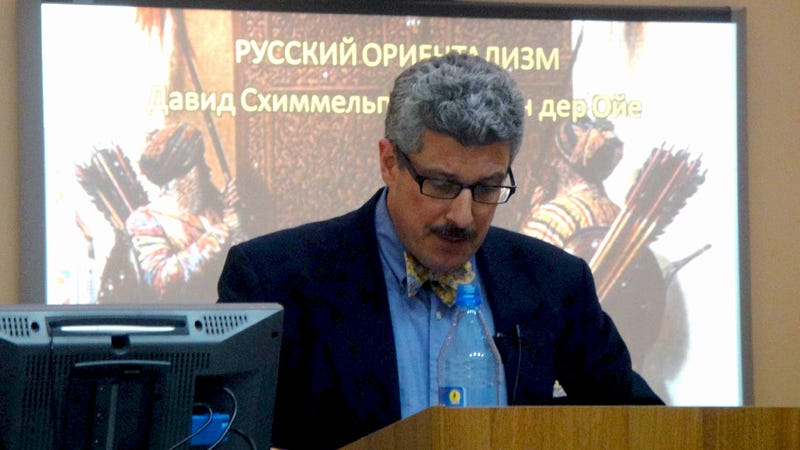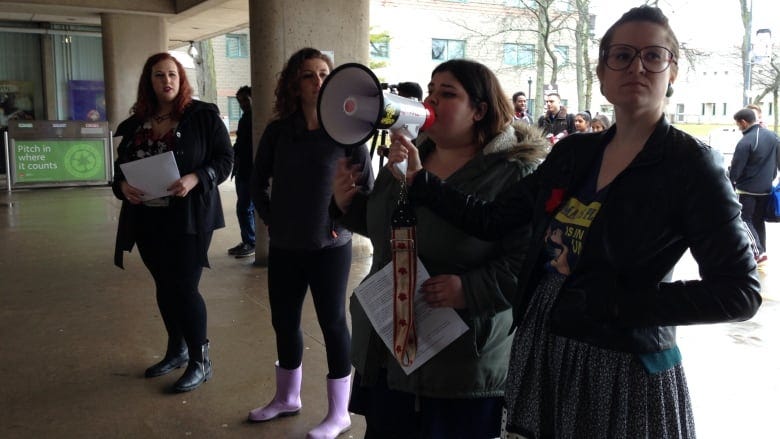Reflections on the Sad End of a Brock University Mobbing
It's a story of feminist hysteria, non-existent university leadership, and the weaponization of activist journalism
I learned last week that Professor David Schimmelpenninck van der Oye, victim of a feminist mobbing that began in 2016, died on March 14 of this past year at only 64 years of age. I never met Dr. Schimmelpenninck and do not know all the details of his experience, but the public record tells an appalling story of media bias, academic pusillanimity, and mob justice that are all too typical of our time.
Until 2016, Professor Schimmelpenninck had been a respected Professor of History at Ontario’s Brock University, recipient of many research grants on pre-Revolutionary Russian history, and a member of the Royal Society of Canada. Then a finding of sexual harassment brought a humiliating end to his career. The triviality and vagueness of the alleged incident, combined with the ginned-up outrage and merciless hounding that followed him for years, would hardly be believed if they weren’t now such a regular occurrence at our politically correct universities.
“Ontario Professor Who Sexually Assaulted his Student Will No Longer Be Teaching Again This Term and Students are Overjoyed.” This was the 2019 headline in the Narcity, a Toronto-area newspaper for millennials, that marked the nadir of Schimmelpenninck’s public disgrace. Schimmelpenninck had not been found guilty of sexually assaulting anyone even in the Kangaroo Court university investigation he had undergone. But his smearing as a sexual predator had been part of the campaign against him for the preceding three years.
Schimmelpenninck had been found guilty of sexual harassment, not assault, following investigation of an incident in 2014 in which he reportedly expressed romantic or sexual interest in a student who had gone with him to his office after an evening of drinking (more on this later). I say “reportedly” because the precise details of what happened were never made known, and because Schimmelpenninck claimed that he had been drinking so heavily that he could not remember what he had said or done that night. Ultimately, the word of his accuser, who came forward nearly a year after the alleged incident and whose own questionable level of sobriety seems never to have been ascertained, was enough to ruin his life and perhaps hasten his death.
The sordid story first broke in 2016 when Schimmelpenninck was suspended without pay amidst a gathering firestorm propelled by a series of inflammatory articles by Canada’s state broadcaster, the CBC, and picked up by other papers. Without the CBC’s continual stoking of the fire, it is highly unlikely that the Brock campus community would have known or cared about a professor’s suspension.
In March of 2016, CBC News reported that “About 60 people attended a demonstration” demanding the resignations both of Schimmelpenninck and of the university administrator who had handled his case. Protesters were outraged that Schimmelpenninck’s accuser had allegedly been told “to keep quiet” about the investigation, which had determined, according to the CBC’s quaintly Victorian language, that the professor “gave her alcohol and tried to force himself on her.”
Responding in the manner typical of cowardly academics, the university president neglected to point out the inaccuracies of the reporting on Schimmelpenninck’s alleged infraction, and thanked the gathered mob for their help in “rais[ing] awareness of the need for more effective ways of helping survivors of sexual harassment and violence.” He promised that Brock would do better in future. In the meantime, Schimmelpenninck was suspended without pay for four months, forced to take an extended leave of absence, demoted from a position as Associate Dean of Graduate Studies, required to undergo treatment for alcoholism, and restricted from attending university events or coming to campus without written permission.
In the following years, Schimmelpenninck underwent substance abuse therapy and agreed to additional terms regarding his projected return to campus. He met regularly with an alcohol counsellor, took coaching on “respectful workplace practices,” and agreed to a set of strict conditions according to which he would never again socialize with any student and would not meet with students except in public places. Scheduled to return to the classroom in the fall of 2018, he had to force the university, with the support of his union, to adhere to his contract after the university, frightened or encouraged by rumblings from campus activists, cancelled his fall classes and tried to pressure him into taking early retirement (see full report on the arbitration here). After this, perhaps hoping to get ahead of the bad press, Schimmelpenninck went public with a statement of remorse, saying he “regretted [his] past behavior,” and would undo it if he could. At this point, he was clearly still hoping that he would be able to resume his academic life.
But punishment and contrition were not good enough when the CBC and other papers ran a series of new articles on Schimmelpenninck in early 2019, rehashing the lurid charges and reporting as if Schimmelpenninck’s appearance in a university classroom—he was scheduled to teach a non-compulsory second-year course in January of 2019—might in some unspecified manner pose a threat to female safety. Once again, students mobilized and demanded the administration protect them, specifically by preventing Schimmelpenninck’s dread return. A petition was launched and the administration was besieged with irate letters. A mass campus protest was planned for Schimmelpenninck’s first day back, and a sexual violence coordinator lamented Brock’s alleged failure “to prevent violence and support survivors.”
Not surprisingly, the university folded under the pressure, announcing the cancellation of the course as a result of the uproar. Students expressed their satisfaction, making clear that as far as they were concerned, Schimmelpenninck could never be rehabilitated. “When you overstep your boundaries of power, it’s very difficult to step back from that,” commented one of the activists demanding his resignation. She also complained about the perceived inadequacies of his contrition, noting that “Because his statement very heavily focused on his dealings with alcoholism and maybe having a problem, he wasn’t as open to actually admitting the fact that he was found to have perpetrated sexual violence against a student.” It did not occur to her or to any of Schimmelpenninck’s detractors, it seems, that his comments about alcohol might have been the simple truth.
No one amongst the Brock administrators seems to have emphasized that Schimmelpenninck had not actually committed “sexual violence.” The extent of his transgression was that he had gone drinking at a campus bar with some of his students. All of the students were of legal drinking age. When the bar closed, a female graduate student and a male student went back with him to his office to continue drinking. The male student eventually left the office, and the female student stayed on in the early morning hours. When Professor Schimmelpenninck moved to sit next to her, according to the lawyer who investigated the case, he made “an unwelcome sexual advance” that involved “inappropriate and unwelcome physical touching, comments of a sexual nature, [and] a provocative comment attempting to arrange ongoing intimacy.”
The description is vague at best, almost meaningless, and definitely not worth, in my opinion, the hyperventilating expressions of fear and outrage that ensued. Note that it was “physical” and not “sexual” touching—an important distinction. “Physical” touching indicates that the professor did something minor enough that neither the aggrieved student nor the supine university administration nor the lawyer brought in to adjudicate the case considered it sexual assault, which in Canadian law can include almost any kind of sexualized touching.
Professor Schimmelpenninck, in other words, did not sexually assault his graduate student. Neither did he harass her according to any common understanding of the term. At worst—and accepting the student’s year-old and possibly alcohol-fuddled recollection of the incident—he had made the mistake of thinking that a woman who liked him enough to come to his office after bar closing time and to stay on drinking with him after her friend left, was romantically interested. Perhaps he was entirely wrong, and perhaps she was genuinely shocked and taken aback, even frightened; or perhaps none of it happened just as she said. But in her account, there is no suggestion that after she rejected his advance, he kept on trying, or that he was in any way aggressive or threatening.
Here the public record ended, with Schimmelpenninck once against unable to return to teaching. I can only conclude that he never taught again, and was forced into retirement two years later. The university that might and should have defended his right to teach after his period of discipline probably worked behind the scenes to get rid of him. Stripped of his dignity and perhaps with his health battered from the ordeal, Schimmelpenninck probably decided there was no point fighting on.
I sometimes wonder if Schimmelpenninck’s accuser ever had regrets about the years-long pillorying of the man who had dared to express his attraction to her. Mob justice provides no one, including the alleged victim, with avenues for rethinking or reconciliation, and now Schimmelpenninck’s untimely death closes off all possibilities of social healing. As for the mob members themselves—and the reporters who kept talking about an act of sexual violence that had never occurred—they probably forgot about Schimmelpenninck as soon as they finished destroying him in order to ready themselves for their next social justice campaign.





I first read about this type of thing happening in Daphne Patai's book "Heterophobia" and Katie Roiphe "The Morning After".
There has been a few cases mentioned in Quillette where the lives of academics are destroyed by the Universities Star chambers.
From what I can recall there have been a number Academics, mostly male, I believe who have passed away after facing these Kangaroo courts.
A thought I have had is that perhaps there should a record like an honour roll of the people who suffer such injustices.
It is quite astounding the extent to which they really can't help themselves.
One would think that if they had a truth to tell they would not want it discredited by bad behaviour on their part.
But this they simply cannot do.
Has their hatred warped their tiny minds that far?
Are they such deluded hypocrites as to really think that their rage, which they imagine to be righteous is exempt from the strictures they would impose on others?
We see that feminism is a hate movement in and of its essence. And it is its theory that refutes the claim that some extremists hate because they are hateful people. No. they hate because feminist theory demands it
And except for lame appeals of sympathizers that "abusus non tollit usum" (look it up. google is still good for something) and passionate denials by adherents that they are a hate movement their actions and their theory - feminist theory most telling of all IMO - show us that they are a hate movement
and that they really can't help themselves